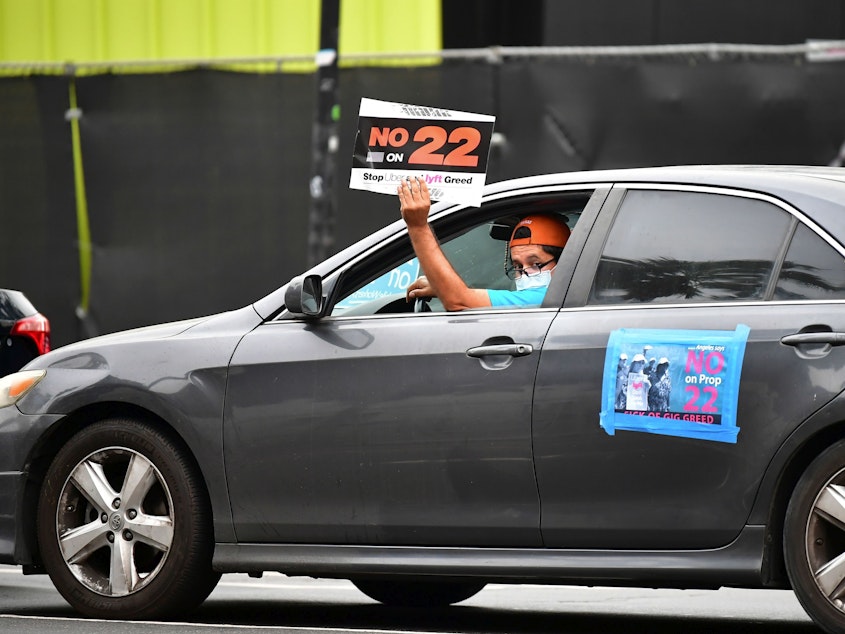California Voters Give Uber, Lyft A Win But Some Drivers Aren't So Sure

California voters handed Uber and Lyft a big victory — and labor unions a big setback — when they approved a measure allowing the ride-hailing companies to keep classifying their drivers as independent contractors.
For Joe Renice, who drives for Uber in San Francisco, the measure's passage was a relief.
"This is a job that I make over $100,000 a year doing. And I have complete and total freedom and flexibility to do that," he said.
The measure, known as Proposition 22, cements the business models of transportation and food delivery apps, which pay workers for the services they provide on demand. If the measure had failed, the companies would have had to abide by a new state law that says gig workers should be considered employees, and therefore entitled to costly benefits like unemployment, health insurance and paid sick leave.
Proposition 22 does mandate that the companies offer drivers some new benefits, including stipends to buy health insurance, accident insurance and some guaranteed level of pay. Still, it's a far cry from the standard benefits most employers in the state must offer their permanent workers.
Sponsored
Renice says most people know what to expect when they start driving for the app companies.
"We know going in this is a tradeoff," he said, adding that he is willing to give up benefits like a set salary, retirement savings and insurance "for the ability to do this when and where and how I want to do it."
But, he acknowledged, "it's not for everybody. Some people are better off being employees. Not me."
The companies supporting the measure leaned heavily on drivers who share Renice's view to make their case to voters. They blanketed the state with TV, radio and internet ads featuring drivers talking about why they support the measure.
If somehow Californians failed to see those ads, they were likely to catch the messages that came by text, on flyers in mailboxes, and on delivery bags used for takeout. The companies even used their own apps to lobby drivers and passengers, sparking a lawsuit from some drivers.
Sponsored
In all, Uber, Lyft and the food delivery app DoorDash spent more than $200 million dollars in support of Proposition 22, making it the most expensive ballot measure campaign in California history.
Opponents raised less than a tenth of that amount. Their campaign banked on free publicity around events such as driver protests outside Uber's San Francisco headquarters and the home of chief executive Dara Khosrowshahi.
Khosrowshahi celebrated the victory in an email to drivers on Tuesday night. "The future of independent work is more secure because so many drivers like you spoke up and made your voice heard — and voters across the state listened," he wrote.
But not all drivers were happy with the outcome.
"Drivers are being taken advantage of and Prop 22 was really just an attempt by Uber and Lyft to legalize it," said Jerome Gage, a Lyft driver in Los Angeles who worked on the campaign opposing the measure. "Drivers now, more than ever, need to organize and improve our working conditions."
Sponsored
The proposition was opposed by labor groups who had helped shape the state law Uber and Lyft were rejecting. They said the companies' emphasis on flexibility is a distraction, since nothing in the law, known as AB5, requires them to set schedules for drivers. Instead, they said, the companies were seeking special treatment to avoid taking on the costs of providing full employment benefits.
"What happened here was a legal and power grab by billionaires to deprive workers from their workers' rights and human rights," said Edan Alva, a former Lyft driver and an organizer with the labor group Gig Workers Rising.
Organizers said the election results were a blow, but they said they would not back down from continuing to organize drivers and push for greater labor protections.
Uber and Lyft are still facing a lawsuit from the California government, which has been trying to force them to comply with AB5. The ballot measure does not end that legal battle, but it will probably have a far more limited impact on the companies.
Labor groups are also looking beyond California, to other states that are facing off with Uber and Lyft over whether drivers are employees.
Sponsored
"My pride is hurt," Gage said. "But one thing that has been inspiring me is the energy in this grassroots level effort to fight Uber and Lyft."
Editor's note: Lyft and Uber are among NPR's financial supporters. [Copyright 2020 NPR]



